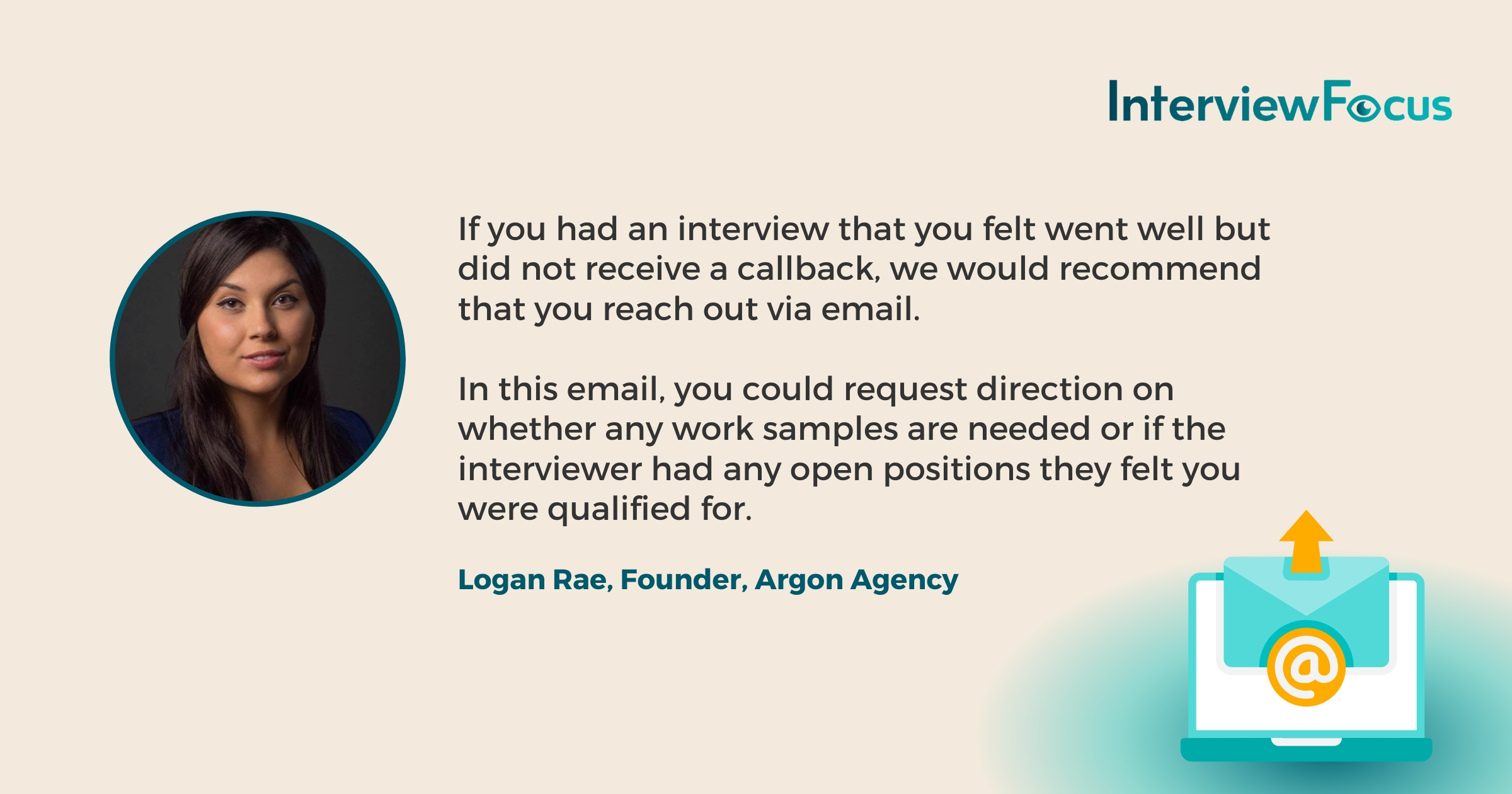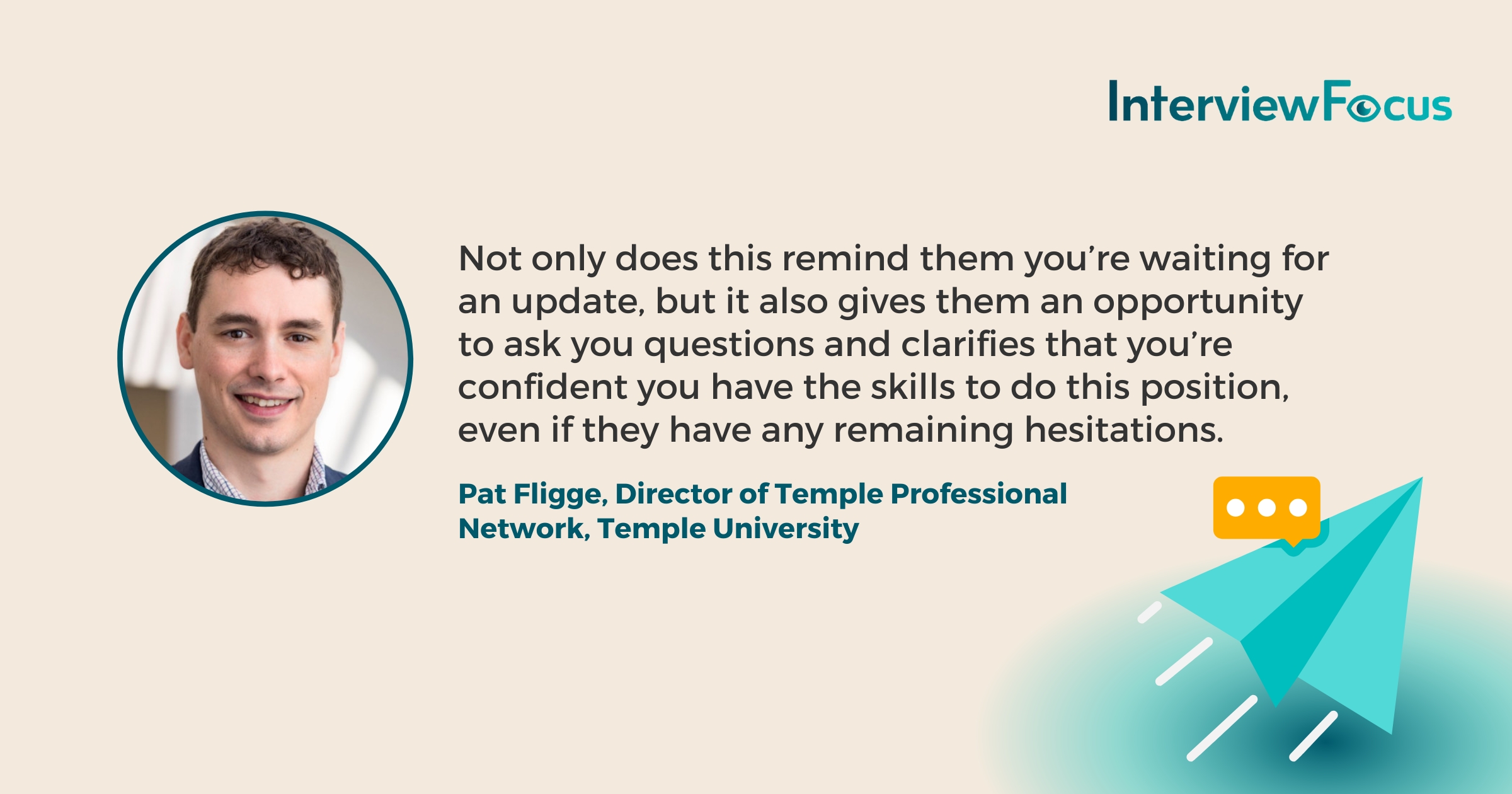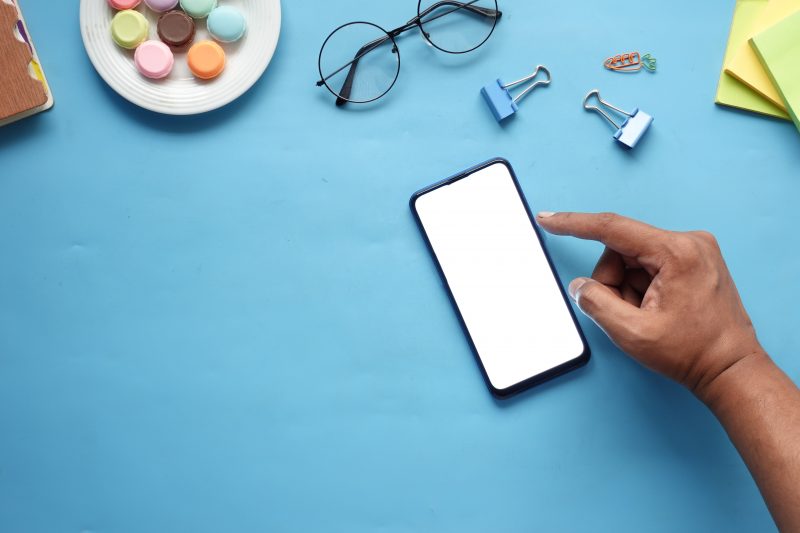From studying your interviews to networking, here are 13 answers to the question, “What are the most helpful recommendations a person should do if they had a job interview but no callback?”
- Examine Your Interview Style
- Follow-up via Email
- Keep Applying to Other Companies
- Let Them Know You’re Open to Other Positions
- Thank Them and Ask for Feedback
- Don’t Follow-up Multiple Times
- Don’t Take Rejection Personally
- Move Up the Chain
- Always Maintain a Positive Relationship
- Stay Patient
- Offer to Fill in Any Gaps
- Send a Thank-You Card
- When in Doubt, Network
Examine Your Interview Style
A résumé gets you the interview. An interview closes the deal. If you don’t close, it’s because another candidate offered more, or you botched the conversation. The latter is fixable. There’s a reason top athletes watch game tape and work with a coach; they both objectively offer the truth. If you’re not getting callbacks, call a career coach. It’s likely time to watch some game tape and adjust your play. The right coach can help you close.
Tim Toterhi, CHRO, Plotline Leadership
Follow-up via Email
If you had an interview that you felt went well but did not receive a callback, we would recommend that you reach out via email.
In this email, you could request direction on whether any work samples are needed or if the interviewer had any open positions they felt you were qualified for. Sometimes the roles we interview applicants for require qualifications they may not have, but they would be a great fit if they took some courses to gain the necessary skills. We will always make room for an applicant who takes the time to become qualified.
Logan Rae, Founder, Argon Agency

Keep Applying to Other Companies
It’s important to stay positive and persistent during the job search process. Just because a person didn’t get one job doesn’t mean that they won’t be a good fit for another position. They should keep looking for other opportunities and don’t get discouraged, as it can take time to find the right fit. It’s common to apply to multiple positions before finding a job. Staying active and engaged in the job search process can also help in building connections and skills that can be valuable in the future.
Natalia Brzezinska, Marketing & Outreach Manager, UK Passport Photo
Let Them Know You’re Open to Other Positions
A long period of silence after the interview probably means someone else got the job. It’s important to know that it’s not the end of the world. In fact, it doesn’t even mean that you can’t get hired by that company.
A great way to turn rejection into a potential success is by letting the employer know that even though you didn’t land the position you applied for, you’re still interested in exploring other opportunities within the organization.
You can do so by emailing the recruiter, or better yet, by sending them a message on LinkedIn if it’s possible to connect with them there. Make sure you briefly explain why you’d be an excellent addition to the company.
For example, you could talk about your values and how they align with those of the employer. Even if this method won’t grant you another interview right away, at the very least you’ll keep your options open for the future and help your professional network grow.
Maja Kowalska, Community Manager, Zety
Thank Them and Ask for Feedback
When you go to an interview, it is very important to send a thank you note to everyone involved—the person scheduling it and each person that was part of conducting the interview. Make a note of something unique discussed in the interview to help them remember you and the interview.
Afterward, if you still don’t hear from them, reach out again and ask them for feedback. Let them know you want to be sure you are putting your best foot forward for future interviews, so you sincerely want to know what you did well and what you can improve. Thank them in advance for providing the feedback.
Cathy Liska, CEO, Center For Coaching Certification
Don’t Follow-up Multiple Times
While it can certainly be tempting (and there’s no denying it’s frustrating when you don’t get a callback), my advice is not to follow up multiple times with the same question of whether you will hear back. One follow-up is fine, however, multiple will probably result in the same answer and not prove to be fruitful.
Wendy Makinson, HR Manager, Joloda Hydraroll
Don’t Take Rejection Personally
Rejection is a difficult pill to swallow, but there are many reasons why you may not have heard back. The job may have been put on hold or reduced in salary or responsibility. These types of things are rarely broadcasted publicly. While not getting a job you applied for can be disappointing, make sure you don’t take it as a reflection of your abilities.
Brian Munce, Managing Director, Gestalt Brand Lab
Move Up the Chain
Move up the chain of command by connecting directly with either the person who interviewed you or their superior. This shows your commitment and interest in the position. Try to contact them via email or phone, reiterating why you are an ideal fit for the role, and elaborating on your qualifications even further. With a bit of additional research and an eager attitude, you may rekindle your candidacy and land yourself the job!
Ludovic Chung-Sao, Lead Engineer & Founder, Zen Soundproof
Always Maintain a Positive Relationship
If you had a job interview but have not received a callback, it’s a good idea to reach out to the employer to inquire about the status of your application. This shows that you are still interested in the position and that you are proactive. You can send a short and polite email or make a phone call to the employer or the person who conducted the interview to ask if they have any updates on the hiring process.
If you don’t receive a response or are told that the position has been filled, it’s important to thank the employer for the opportunity and ask if there are any other open positions or if they would keep your application on file for future openings. It’s always a good idea to maintain a positive relationship with potential employers, even if they do not select you for the original position.
Brad Cummins, Founder, Insurance Geek
Stay Patient
There are tons of reasons an interviewer may not have reached out yet. They could be filling multiple positions, waiting on input from the team, or still deciding. They may also be delayed for another hard-to-predict reason.
It’s important to be patient and not jump to conclusions. You may hear from them soon; so, before you send any sort of follow-up message, at least wait until any deadline they gave you has passed. If they did not mention any deadline, it’s still best to wait at least a week before reaching out.
Carrie Shaltz Haslup, Founder & CEO, Tabeeze
Offer to Fill in Any Gaps
As the great philosopher Tom Petty said, “The waiting is the hardest part.” I know you can feel powerless as you wait to see if that employer will get back to you. How do you politely ask them to let you know what’s going on? How do you remind them you exist and are waiting to know what happens next?
When you’re in this position, I suggest emailing your contact with the employer and saying some version of the following:
“I want to check in on the status of your hiring process. If you’re unsure of whether I should make it to the next round of the process or have any remaining questions about my background, please let me know. I’d be happy to provide any answers or additional thoughts that would be helpful. Thank you!”
Not only does this remind them you’re waiting for an update, but it also gives them an opportunity to ask you questions and clarifies that you’re confident you have the skills to do this position, even if they have any remaining hesitations.
Pat Fligge, Director of Temple Professional Network, Temple University

Send a Thank-You Card
If it’s a job you’re really interested in, mail a thank-you card to your interviewer. Everyone’s email inbox is full, but almost nobody sends mail anymore, which will help you stand out.
In the thank-you card, express your gratitude for being considered, perhaps include a follow-up statement regarding one question from the interview, and also express your excitement about joining the team.
That simple handwritten card arriving in the mail might give you the edge to squeeze out a competing applicant. And yes, in a tight race between two highly qualified candidates, I have gone with the person who sent a thank-you card. It showed they were motivated, highly interested, and also willing to go the extra mile to communicate. I wasn’t disappointed. They were just as diligent in communicating with clients, which was a key part of their job.
Jason Bland, President, Custom Legal Marketing
When in Doubt, Network
When you interview for a position, it’s easy to get caught up on this one opportunity. I call this the “shiny penny syndrome.” You need to focus on putting out great energy and know this will work out for you. This might not be the company for you today, but it could be in a year or two. Or maybe the hiring manager will go to another company and that will be where your next dream job will be.
Regardless of whether you get the job, you need to network and keep in touch. You might not ever know why you didn’t get the interview callback. You should recap and think about how you could have done better and use it as a learning moment.
Yet, you should never dwell. Network with the people you met via LinkedIn. Message them to tell them why you are still interested and tell them why you enjoyed meeting them. Get personal, not generic. If you want to be remembered for this job, or any other company this person works at down the road, then make a connection and lasting impression.
Brianna Rooney, CEO, The Millionaire Recruiter






